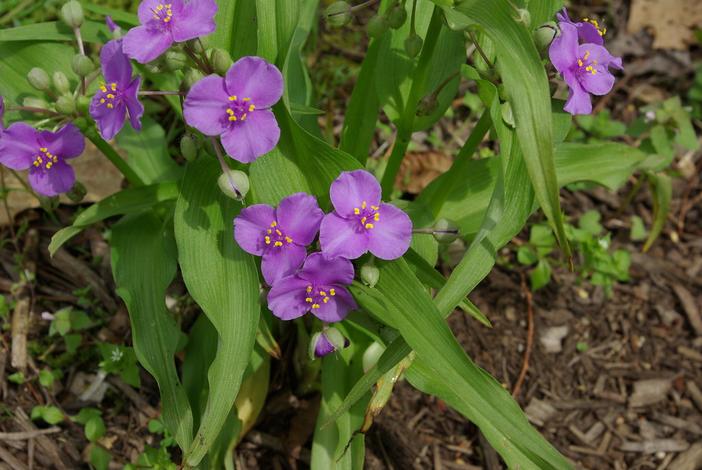Ernest’s Spiderwort
(Tradescantia ernestiana)
Ernest’s Spiderwort (Tradescantia ernestiana)
/
/

Pam Morgan
CC0 1.0
Image By:
Pam Morgan
Recorded By:
Copyright:
CC0 1.0
Copyright Notice:
Photo by: Pam Morgan | License Type: CC0 1.0 | License URL: https://creativecommons.org/publicdomain/zero/1.0/ | Uploader: pk2morgan | Publisher: Flickr























Estimated Native Range
Summary
Tradescantia ernestiana, commonly known as Ernest’s Spiderwort, is a perennial herb that is semi-evergreen to evergreen, depending on the climate. It is native to limestone glades, rocky woods, and bluffs in the South-Central United States, particularly in Missouri and adjacent states. This plant typically grows to a height and width of 1-2 feet (0.3-0.6 meters), forming clumps of arching, grass-like leaves. The flowers, which appear in late spring to early summer, are small but quite showy, with three triangular petals that can be blue, pink, purple, or red, and they are often visited by pollinators.
Ernest’s Spiderwort is valued for its ability to thrive in dry, rocky soils and its tolerance of partial to full shade, making it a versatile choice for gardeners dealing with challenging light conditions. It is often used in rock gardens, woodland gardens, and native plant gardens. The plant requires consistent moisture but is relatively low-maintenance once established. It is not commonly afflicted by diseases or pests, but spider mites and aphids can occasionally be a problem. It is also deer-resistant, which is a notable benefit for many gardeners.CC BY-SA 4.0
Ernest’s Spiderwort is valued for its ability to thrive in dry, rocky soils and its tolerance of partial to full shade, making it a versatile choice for gardeners dealing with challenging light conditions. It is often used in rock gardens, woodland gardens, and native plant gardens. The plant requires consistent moisture but is relatively low-maintenance once established. It is not commonly afflicted by diseases or pests, but spider mites and aphids can occasionally be a problem. It is also deer-resistant, which is a notable benefit for many gardeners.CC BY-SA 4.0
Plant Description
- Plant Type: Herb
- Height: 1-2 feet
- Width: 1-2 feet
- Growth Rate: Moderate
- Flower Color: Blue, Pink, Purple
- Flowering Season: Spring
- Leaf Retention: Evergreen
Growth Requirements
- Sun: Part Shade, Full Shade
- Water: Medium, High
- Drainage: Medium
Common Uses
Bee Garden, Bird Garden, Butterfly Garden, Groundcover, Hummingbird Garden
Natural Habitat
Native to limestone glades, rocky woods, and bluffs in the South-Central United States
Other Names
Common Names:
Scientific Names: , Tradescantia ernestiana, Tradescantia ernestiana f. alba,
GBIF Accepted Name: Tradescantia ernestiana E.S.Anderson & Woodson